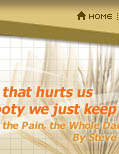From Here, You Can't See Paris: Seasons of a French Village and Its Restaurant
by Michael S. Sanders
Overview
From the Publisher
From Here, You Can't See Paris is a sweet, leisurely exploration of the life of Les Arques (population 159), a hilltop village in a remote corner of France, untouched by the modern era. It is a story of a dying village's struggle to survive, of a dead artist whose legacy began its rebirth, and of chef Jacques Ratier and his wife, Noëlle, whose bustling restaurant — the village's sole business — has helped ensure its future.
The author set out to explore the inner workings of a French restaurant kitchen but ended up stumbling onto a wider, much richer world. Whether uncovering the darker secrets of making foie gras, hearing a chef confess his doubts about the Michelin star system, or absorbing the lore of the land around a farmhouse kitchen table after a boar hunt, Michael Sanders learned that life in Les Arques was anything but sleepy. Through the eyes of the author and his family, the reader enters this world, discovers its still-vibrant traditions of food, cooking, and rural living, and comes to know the village's history, sharing along the way an American family's adventures as they find their way in a place that is sometimes lonely, often wondrous, and always fascinating.
My thoughts
Billed as "Seasons of a French Village and its Restaurant", and more importantly recommended to me by a friend as potentially interesting, I ordered the book from Amazon.com. I now know more about foie gras than I ever wanted to know!!
I admit to a fascination with France...and Paris...and apparently even not-Paris! I also enjoy cooking, not that you'd know it by the reviews on this site (!) so I suppose it's natural that I was eager to read a book that combined travel and cuisine.
I'm not sure what I expected but this probably wasn't it. I enjoyed the book a lot, and if I ever find myself in Les Arques I will definitely plan on visiting La Recreation, after all I feel like I know Jacques and Noelle! I guess what surprised me about the book is that it was less about the restaurant and more about the community than I anticipated.
Two things annoyed me about the book: The lists of things that seemed to go on and on, and the too-many references by the author that he was there to write a book. For some reason, both of those things took away from the story itself. Regarding the lists, let me share a short excerpt:
The small barn...holds an even more interesting collection...trailers of various sizes, three hand-hewn ladders, a water tank on wheels, screens for drying walnuts and plums, plow blades and cutter arms, miles of heavy black plastic, a wheelbarrow made entirely of wood, a jumble of pallets, three or four dozen old tires, a harrow, a tiller, an iron plow...
It's admittedly my little quirk but why do we need to know there are miles of heavy black plastic and a jumble of pallets?!?!
The chapters on foie gras and truffles were particularly entertaining and eye-opening! I had NO idea! I also enjoyed the conversations about the local election. As I mentioned above, I feel like I know Jacques and Noelle, and I'd love the honor of meeting them some day. At the end of the book, the tips to travelers seem useful, and I'm glad the author took time to share etiquette with us. Overall it was a highly enjoyable book!
Favorite Passage
When I arrived, Raymond was carrying the French flag while Patrick bore a sober bouquet. "We decided," he told the assembled crowd, "as our first official act to lay flowers at the memorial to honor the dead. So we will go down, lay the flowers, say a few words, then come back up to continue with activities a little more festive."
...Patrick placed the wreath at the base of the monument. He stepped back a few feet and clasped his hands in front of him, his head bowed. I noticed the villagers doing the same. Yves Astorg, in a green sweater and scuffed corduroys, stepped forward, went up to the memorial, and perched a pair of bifocals on the end of his nose. On the east side of the memorial are the words: "To It's Children Who Gave Their Lives for France, From a Grateful Les Arques."
"Soulie, Joseph," he intoned, leaning forward.
"Mort pour la France." He died for France, the crowd murmured.
"Verny, Joseph."
"Mort pour la France."
"Perie, Noel."
"Mort pour la France."
"Jurguet, Marcel."
"Mort pour la France."
...On and on the family names rang out, familiar and well-worn as the old stone all around, most whose blood still ran in the bodies that made up this gathering...At this moment all over France, in many of the thirty thousand small villages just like Les Arques, the same ritual was taking place, the roster of the dead different surely, but the brief moments of remembrance just the same...As I looked around at the old and the young, it struck me that this was the most patriotic moment I had ever witnessed in this country, where people are generally cynical and negative about their government. It struck me very forcefully, too, that this was part of what it meant to live in a village like this, where the names on the monuments and in the graveyards were your own flesh and blood.







